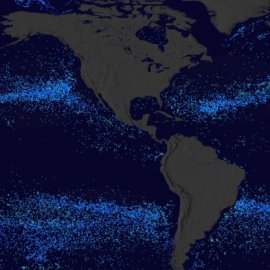Plastic: Cycle and Recycle
-
English
-
ListenPause
[Intro music]
Welcome to World Ocean Radio…
I’m Peter Neill, Director of the World Ocean Observatory.
Plastic! The once whispered mantra for the future. It was an invention that would enable the world, a new profitable by-product of fossil fuel, a cheap replacement material for metal parts, a medium by which to substitute the durable and long-lived with the disposable and short-termed, a facility to consume more, make more, and discard more in unimaginable volume. The plastic bottle and bag may be the single most utilitarian objects of the modern era. Plastic and its composites are rapidly replacing metal in automobile construction, as body panels, interior features, even window and windshield glass. Our food, our health products, our clothing, our toys, our recreational toys, our television screens, computers and smart phones – all are plastic conceived to package, construct, and deliver the necessities of living, and now, consequently, no longer a solution, but rather as pollution, a critical problem worldwide manifest as plastic waste befouling our oceans, our rivers, and, as micro-fibers, our food, even our bodies.
As plastic is oil-based, often produced by the same industries, the insidious cycle of consumption-driven collusion between our need for energy and utility and the products and by-products derived from the exploitation of fossil fuels continues. Just as conventional energy pollutes our air through emissions that infect our atmosphere, our ocean, our watershed, and the natural biodiversity on which we depend, so too does plastic emulate the cycle with less visible, but equally harmful outcome.
The problem has been identified, but what has been done to solve it?
The vested interests – the producers, ancillary users, lender banks, shareholders, and the market forces they control – have been called out, but too little avail. We drill for more oil than ever before; we make more, use, more, and throw away more than ever before. Some redress has been attempted: disappointing international conferences for climate change; financial pledges to compensate the most victimized unfulfilled; ESG environmental sustainability standards defined by government and ignored; even so-called “green” financial instruments and investment funds contrived and co-opted by hypocritical mis-communication and outcome.
Carbon offsets are an example: the monetization of carbon output exchanged voluntarily or by sale to allow one party’s production to be maintained or enhanced offset by the other party’s reduction or shift to alternative source. A market is thus created, and many energy companies have taken advantage to sustain or increase production, thus emissions, rather than reducing fossil fuel consumption or seeking alternative source. What seems counter-intuitive about the method is that, while rewarding solution in one instance, it extends and exacerbates the problem in another – clever but ultimately not effective.
It seemed inevitable that this approach would find its way to plastic; indeed, the concept of plastic credits has emerged to value a specific quantity of plastic removed from the environment or recycled as a waste management initiative to be “sold” to another party to offset their plastic footprint without reducing their own. As with carbon, plastic offsets can be used to enhance reputation over reduction for a fee.
There is much talk these days in the policy and finance community of something called “the circular economy,” an economic system based on the reuse and regeneration of materials or products, especially as a means of continuing production in a sustainable or environmentally friendly way. It seems to me that a consumption-based society is, by definition, circular, that is, it transforms natural and human asset value into products and services that are cycled into economy and community and recycled as the quality of life, the health and welfare, of society individually and collectively. When there is associated waste, as environmental pollution and societal distress, the circle is broken, and the connection between the resources corrupted. We are there now, living in the disconnection, confused, and failing to cycle and recycle our aspirations into continuity and reward. Offsets -- plastic, fossil fuel, or otherwise -- are not the answer.
But what is? Stay tuned…as…
We will discuss these issues, and more, in future editions of World Ocean Radio.
[outro music]
Plastic. It is ubiquitous. It is everywhere in our lives, yet we do not possess the cycle or recycle to continue production in a sustainable or environmentally friendly way. If offsets and recycling do not provide the answer to the plastic pollution problem, what does?
About World Ocean Radio
World Ocean Radio is a weekly series of five-minute audio essays available for syndicated use at no cost by college and community radio stations worldwide. Peter Neill, Director of the World Ocean Observatory and host of World Ocean Radio, provides coverage of a broad spectrum of ocean issues from science and education to advocacy and exemplary projects.
World Ocean Radio
14 Years, 700+ Episodes
Ocean is climate
Climate is ocean
The sea connects all things
- Login to post comments



